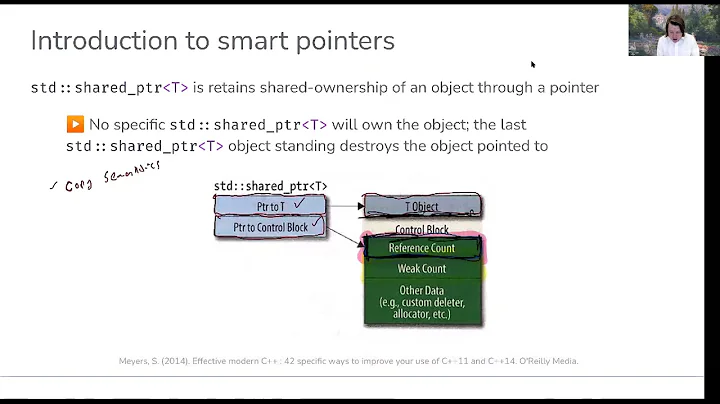std::unique_ptr vs std::shared_ptr vs std::weak_ptr vs std::auto_ptr vs raw pointers
what idiom is each smart pointer supposed to replace?
Every single one of them, ever, that eventually involved destroying the pointed-to resource. So in other words, virtually all of them. I can think of no idioms involving raw pointers that did not involve destroying a pointed-to resource. Every other use isn't really an idiom, it's just "Using a pointer".
Related videos on Youtube
Comments
-
Casey almost 2 years
What are the equivalent uses of each smart pointer in comparison to similar (but not limited to) some advanced techniques using raw pointers?
My understanding is minimal, but from what I can gather:
- Raw Pointers: Only use if you really, really, really, really, know what you are doing and have carefully hidden usage behind an interface.
- std::auto_ptr: Obsolete never use.
- std::unique_ptr: Singleton pointer that transfers ownership upon assignment.
- std::shared_ptr: Reference counted pointer that does not transfer ownership upon assignment but increments its reference count. When all references leave scope or are explicitly
std::shared_ptr::resetthe underlyingdeallocatoris called. - std::weak_ptr: A sub-type
std::shared_ptrthat does not increment the reference count and is invalidated when its parentstd::shared_ptrno longer exists. May return and invalid reference. Always check before using.
RAW POINTER EQUIVALENT EXAMPLES
Reference counting, cache implementations:
std::map<std::string, std::pair<long, BITMAP*> > _cache;Singletons with transfer of ownership:
class Keyboard { public: //... static Keyboard* CreateKeyboard(); ~Keyboard(); //... private: //... Keyboard(); static Keyboard* _instance; //... };Aggregate Containers, no ownership: Spatial partitioning graphs and trees, iterative containers, etc.
Composite Containers, ownership: Large objects.
--EDIT--
As I am working I came upon an interesting case, DeadMG pointed out that smart pointers are supposed to be used as easy abstractions to take care of resource management; what about file-scope objects that can not be created on the heap at the point of declaration but instead must be created at a later time?
-
Neil Kirk almost 11 yearsI don't understand what you are asking. How to implement smart pointer behavior with raw pointers?
-
Puppy almost 11 yearsI have no idea what this question is, but if you're calling
unique_ptra Singleton pointer, I suspect you have a totally different meaning of Singleton here. -
Casey almost 11 years@NeilKirk The exact opposite, actually, what are the uses of smart pointers compared to raw pointers? i.e. what idiom is each smart pointer supposed to replace?
-
Puppy almost 11 years@Casey: You might want to consider editing that into your question.
-
Casey almost 11 years@DeadMG From MSDN:
...unique_ptr uniquely manages a resource...A resource can be owned by no more than one unique_ptr object; when a unique_ptr object that owns a particular resource is destroyed, the resource is freed. A unique_ptr object may be moved, but not copied.... Given the remarks, I took this to mean that there can only be one resource in existance. i.e. A Singleton. I may be wrong though, like I said, I have minimal understanding of how smart pointers work and are supposed to be used. -
Puppy almost 11 years@Casey: No, there is only one unique_ptr per resource. And even that can be a bit flexible if you start to screw around with custom deleters that do things other than destroy the resource completely.
-
Neil Kirk almost 11 years@Casey Singleton usually refers to a global variable kind of thing.
-
Casey almost 11 years@DeadMG Ohhh, so it's a one-to-one relationship instead of
std::shared_ptrs one-to-many. -
Puppy almost 11 years@Casey: Yes. Singleton is the "I'm just as shitty as a global variable and I add the shitty of only-one-of-my-type" crap.
-
Casey almost 11 yearsAggregate containers don't destroy their pointed-to resources, they just remove them from a list. This is a chief concern that I had when studying smart pointers, which smart pointer would be the likely candidate for such a usage?
-
Puppy almost 11 years@Casey: If they don't destroy their pointed-to resources, why would they use a smart pointer at all? Smart pointers are for destroying things.
-
Casey almost 11 yearsOkay, this is why I was confused. Every person that advocated smart pointers that I'd read vehemently opposed the use of raw pointers in any form or fashion and should be replaced with a smart pointer.
-
Puppy almost 11 years@Casey: That is only for destroyable resources. Raw pointers are still essential observers, just like references.
-
VF1 about 10 years@DeadMG Aren't raw pointers, even as observers, outdated? Unless handling old code which uses
Carrays, either a reference or an iterator would do the job. -
Casey about 10 years@VF1 You can't re-seat a reference. If the observer can ever be null using a reference is not going to work.






